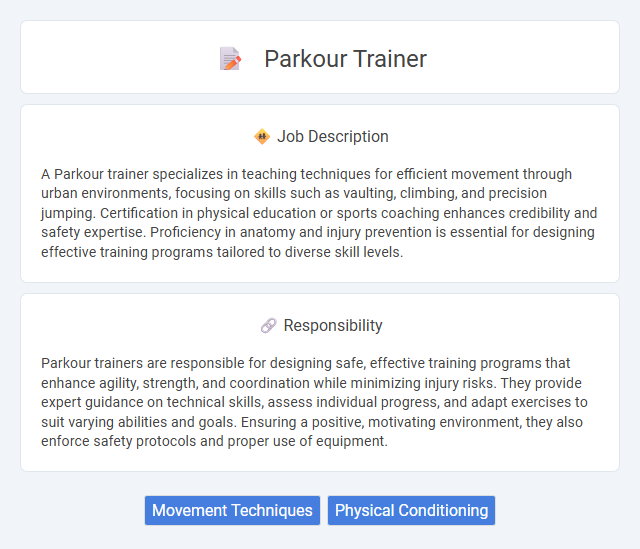
A Parkour trainer specializes in teaching techniques for efficient movement through urban environments, focusing on skills such as vaulting, climbing, and precision jumping. Certification in physical education or sports coaching enhances credibility and safety expertise. Proficiency in anatomy and injury prevention is essential for designing effective training programs tailored to diverse skill levels.
Individuals who possess strong physical fitness, agility, and a passion for dynamic movement are likely suitable for a Parkour trainer job. Those with previous experience in parkour or related disciplines may have a higher probability of excelling in this role. People lacking endurance or who have significant mobility issues might find it challenging to meet the physical demands required.
Qualification
A Parkour trainer must possess extensive experience in freerunning techniques and a deep understanding of physical conditioning and safety protocols. Certification in fitness training, first aid, and specialized Parkour coaching credentials enhance credibility and ensure comprehensive knowledge of injury prevention. Strong communication skills and the ability to design adaptive training programs tailored to varying skill levels are essential qualifications for success.
Responsibility
Parkour trainers are responsible for designing safe, effective training programs that enhance agility, strength, and coordination while minimizing injury risks. They provide expert guidance on technical skills, assess individual progress, and adapt exercises to suit varying abilities and goals. Ensuring a positive, motivating environment, they also enforce safety protocols and proper use of equipment.
Benefit
Parkour trainer positions likely offer significant benefits such as improved physical fitness and enhanced coordination skills for both trainers and students. The role probably provides opportunities for personal growth and the development of leadership abilities through guiding diverse skill levels. Trainers may also benefit from a flexible schedule and the potential to build a vibrant community centered around health and movement.
Challenge
Parkour trainer jobs likely involve constant physical and mental challenges as they require mastering complex movement techniques and adapting to diverse urban environments. The role probably demands creativity to develop training sessions that push students beyond their comfort zones safely. Overcoming these challenges may enhance both the trainer's skills and resilience, making the job highly dynamic and rewarding.
Career Advancement
Parkour trainers enhance their career advancement by obtaining certifications from recognized organizations such as the World Freerunning Parkour Federation (WFPF). Building a professional portfolio through workshops, community events, and social media presence increases visibility and client base, leading to opportunities in coaching, choreography, and fitness training. Networking with gyms, schools, and sports clubs facilitates transitions into specialized roles or entrepreneurship within the urban athletics industry.
Key Terms
Movement Techniques
Parkour trainers specialize in teaching advanced movement techniques such as vaulting, precision jumps, wall runs, and rolls to improve agility, balance, and coordination. They emphasize biomechanics and proper form to reduce injury risk while enhancing strength and spatial awareness. Mastery of fluid transitions and efficient momentum use is crucial for executing complex parkour sequences safely and effectively.
Physical Conditioning
A Parkour trainer specializes in developing clients' physical conditioning to enhance agility, strength, and endurance required for efficient movement through urban environments. Training programs include targeted exercises to improve balance, coordination, and explosive power, essential for safe and effective parkour practice. Emphasis on injury prevention and progressive skill-building ensures athletes maintain peak physical performance while mastering complex parkour techniques.
 kuljobs.com
kuljobs.com